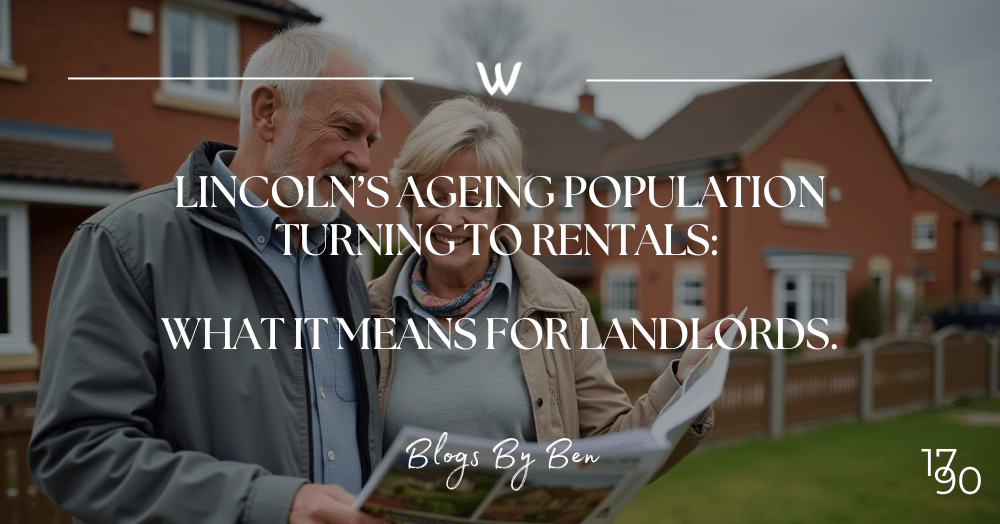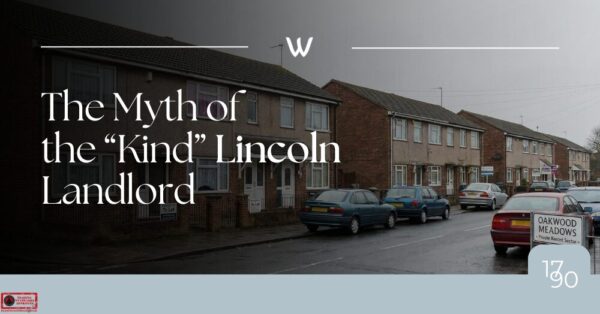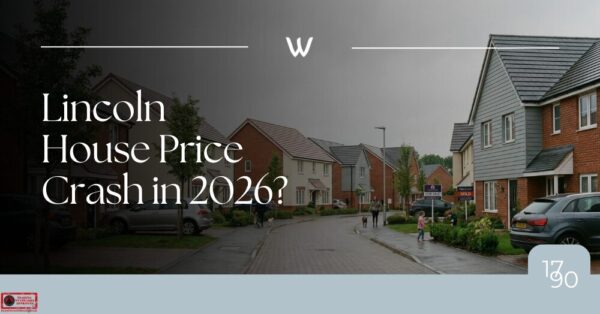Recent figures from the Office for National Statistics reveal that across the UK, 486,795 households are occupied by individuals aged 65 (and over) who live in a private rental sector home. This represents that 6.71% of all OAP’s now renting privately.
Ten years ago, only 267,704 households were occupied by individuals aged 65 (and over) that lived in private rental sector home, (which represented just 4.39% of all older adults).
52.8% increase in OAP’s privately renting
This data raises two crucial questions: How many of these older renters have been tenants their entire lives, and how many have transitioned from homeownership to renting in later years?
In Lincoln, as in other parts of the country, downsizing and renting during retirement can be a practical decision for older generations, enabling them to access the equity tied up in their homes to enhance their financial security. But why are more retirees choosing to rent, and what opportunities does this present for Lincoln’s landlords?
Why Are Retirees Renting?
A survey by the Prudential a few years ago shed light on this trend. Nearly 60% of older renters stated they have always rented, reflecting a lifelong position in the private rental market. Around 20% have sold their homes to address debt challenges, and another 10% have deliberately chosen to sell and rent, using the proceeds to fund their retirement. The remaining renters cite various personal reasons for their choice.
Financial stability in retirement is increasingly important. Men in Lincoln, upon reaching 65, have an average life expectancy of 17.0 years, while women can expect to live an additional 19.7 years. Interesting when compared to the national averages of 18.1 years for men and 20.6 years for women.
However, longer life expectancies come with the challenge of sustaining finances over an extended period, particularly as inflation, rising living costs, and low interest rates erode retirement savings.
The Rental Landscape in Lincoln
23.5% of people who live in Lincoln are 65 years old (or older). A significant majority – 68.1% – own their homes outright. 5.7% own their home with a mortgage. Social housing accounts for 19.2% of these households. Yet, a notable 7.0% of older households – 697 homes – are privately rented.
This figure, while small, is on the rise. Anecdotal evidence from estate agents and local property professionals indicates that more retirees in Lincoln are choosing to sell larger homes and downsize to rented accommodation. This decision often reflects a desire for simplicity and financial flexibility. Selling a family home can free up substantial equity, which older residents might use to assist their grandchildren in purchasing their first homes, secure better returns through investments, or enjoy a more comfortable retirement.
Renting also offers predictability. With a fixed monthly expenditure that typically includes property maintenance and potentially even services like gardening, retirees can budget with confidence. This arrangement removes the financial and logistical burdens of homeownership, such as unexpected repair costs, allowing for a more carefree retirement. Renting also offers flexibility, enabling older tenants to relocate with ease if their circumstances change, such as moving into assisted living or care facilities.
Opportunities for Lincoln’s Landlords
This shift presents a unique opportunity for Lincoln’s buy-to-let investors. Older tenants often seek properties that are low-maintenance and designed to suit their needs. Semi-detached bungalows, particularly those located near essential amenities such as bus routes, GP surgeries, and shops, are in high demand. These homes are often preferred for their accessibility and practicality.
For landlords, catering to this demographic can yield excellent returns. Retirees typically value stability, making them reliable, long-term tenants. Furthermore, if a property meets their needs and provides additional conveniences like included maintenance services, they are often willing to pay a premium rent for the right home.
The Bigger Picture for Lincoln Landlords
As the population ages, the demand for rental properties suitable for older tenants is likely to grow as the Centre for Economics and Business Research (CEBR) stated in the report this summer that they expected the number of OAPs privately renting to double in the next decade. This trend presents both challenges and opportunities for landlords in Lincoln. By understanding the needs of this demographic and tailoring their portfolios accordingly, landlords can not only secure steady returns but also play a role in supporting the housing needs of an ageing community.
For the private rental sector, this demographic shift highlights the importance of creating housing solutions that balance profitability with social responsibility. As leaders in the Lincoln property market, we must champion approaches that meet these emerging needs while promoting long-term sustainability in the rental sector.
As always, I am keen to hear your thoughts – what opportunities do you see in this evolving market?



